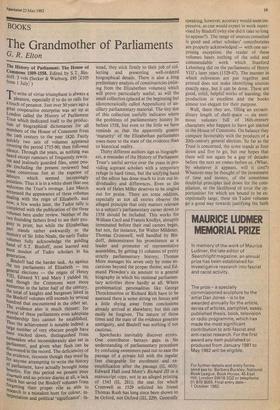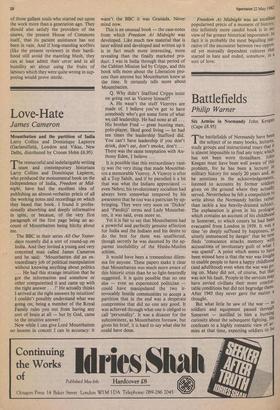BOOKS
The Grandmother of Parliaments
G. R. Elton
The History of Parliament: The House of Commons 1509-1558. Edited by S.T. Bin- doff, 3 vols (Seeker & Warburg. £95 [£105 from 1 July] )
To write of virtue triumphant is always a Pleasure, especially if to do so calls for a touch of penance. Just over 30 years ago a great cooperative enterprise was se up at
London called the History of Parliament Trust which dedicated itself to the produc- tion of biographical dictionaries for all
members of the House of Commons from the 14th century to the year 1820. Fairly quickly two sets of volumes appeared Covering the period 1715-90; then followed silence. Through the years, as nothing was
heard except rumours of frequently rewrit- ten and jealously guarded files, some peo- Ple (including the present reviewer) had some censorious fun at the expense of labours which seemed increasingly
Pointless. Thus it is in a white sheet that one welcomes the Trust's revenge. Last March witnessed the appearance of three volumes dealing with the reign of Elizabeth, and now, a few weeks later, the Tudor tally is completed with the publication of the three volumes here under review. Neither of the two founding fathers lived to see their pro- geny in print; but while the Elizabethan Part stands rather awkwardly to the
memory of Sir John Neale, the early Tudor volumes fully acknowledge the guiding hand of S.T. Bindoff, most learned and most modest of Tudor scholars in his generation.
, Bindoff had the harder task. As against the ten parliaments of Elizabeth — ten general elections — the reigns of Henry VIII, Edward VI and Mary I yielded 16; and though the Commons were more numerous in the latter half of the century, the total of knights and burgesses listed in the Bindoff volumes still exceeds by several
The that encountered in the other set.
the evidence also is much thinner; for several of these parliaments even adequate Membership lists cannot be established. Thus the achievement is notable indeed: a been number of very obscure people have °een tracked down, distinguished from namesakes who inconsiderately also sat in. Parliament, and given what flesh can be discovered in the record. The deficiencies of the evidence, tiresome though they must be for anyone attempting to write the history benefits. Parliament, have actually brought some °enefits. For this period we possess poor Journals and no private diaries at all, a lack which has saved the Bindoff volumes from forgetting their proper role as aids to research in- terpretation in a mistaken hunt for colour, n- terPretation and political 'significance': in-
stead, they stick firmly to their job of col- lecting and presenting well-ordered biographical details. There is also a long preliminary analysis of constituencies (miss- ing from the Elizabethan volumes) which will prove particularly useful; as will the small collection (placed at the beginning but idiosyncratically called Appendices) of an- cillary parliamentary material. The tiny size of this collection usefully indicates where the problems of parliamentary history lie before 1558, but even so the little we have reminds us that the apparently greater 'maturity' of the Elizabethan parliaments owes more to the state of the evidence than to historical reality.
Thirty different authors sign as biograph- ers, a reminder of the History of Parliament Trust's useful service over the years in pro- viding aspirant scholars with a temporary refuge in hard times, but the unifying hand of the editor has done much to iron out in- dividuality and differences. Even so the work of Helen Miller deserves to be singled out for praise. There are some oddities, especially as not all entries observe the alleged principle that only matters relevant to a subject's parliamentary career down to 1558 should be included. This works for William Cecil and Francis Knollys, abruptly terminated before their real careers begin, but not, for instance, for Walter Mildmay. Thomas Cromwell, well handled by Bin- doff, demonstrates his prominence as a leader and promoter of representative assemblies, by getting 11 columns of pretty strictly parliamentary history; Thomas More manages his seven only by some ex- cursions beyond the proper theme; and Ed- mund Plowden's six amount to a general biography in which his minimal parliamen- tary activities show hardly at all. Where problematical personalities like George Throckmorton or Richard Rich have to be assessed there is some sitting on fences and a little shying away from conclusions already arrived at elsewhere; but this can easily be forgiven. The nature of those times and the state of the evidence generate ambiguity, and Bindoff was nothing if not cautious.
Spotchecks inevitably discover errors. One contributor betrays gaps in his understanding of parliamentary procedure by confusing sweeteners paid out to ease the passage of a private bill with the regular fees chargeable for enrolment and ex- emplification after the passage (II, 603): Edward Hall used More's Richard III in a manuscript copy, not in an alleged printing of 1543 (II, 281); the seat for which Cromwell in 1529 solicited his friend Thomas Rush has long since been shown to be Orford, not Oxford (III, 229). Generally speaking, however, accuracy would seem im- pressive, as one would expect in work super- vised by Bindoff (why else did it take so long to appear?). The range of sources consulted is good and other scholars' contributions are properly acknowledged — with one sur- prising exception: the reader of these volumes hears nothing of the solid and commendable work which Stanford Lehmberg did on the parliaments of Henry VIII's later years (1529-47). The manner in which references are put together and printed does not make identifying sources exactly easy, but it can be done. These are good, solid, helpful works of learning; the production is excellent and the books almost too elegant for their purpose.
Well, there they are, filling an extraor- dinary length of shelf-space — six enor- mous volumes full of 16th-century characters who happen to have got elected to the House of Commons. On balance they compare favourably with the products of a 20th-century general election. So far as the Trust is concerned, the score stands at four down and five to go, but one hopes that there will not again be a gap of decades before the next set comes before us. (What, by whenever it appears, wilt it cost?) Whatever may be thought of the investment of time and money, of the sometimes doubtful principles laid down for the com- pilation, or the likelihood of error the op- portunities for which are bound to be ex- ceptionally large, these six Tudor volumes go a good way towards justifying the faith of those gallant souls who started out upon the work more than a generation ago. They should also satisfy the providers of the sinews, the present House of Commons itself, that its patient assistance has not been in vain. And if long-standing scoffers (like the present reviewer) in their hardi- hood still avoid the mantling blush, they can at least admit their error and in all humility set about using the fruits of labours which they were quite wrong in sup- posing would prove sterile.







































 Previous page
Previous page